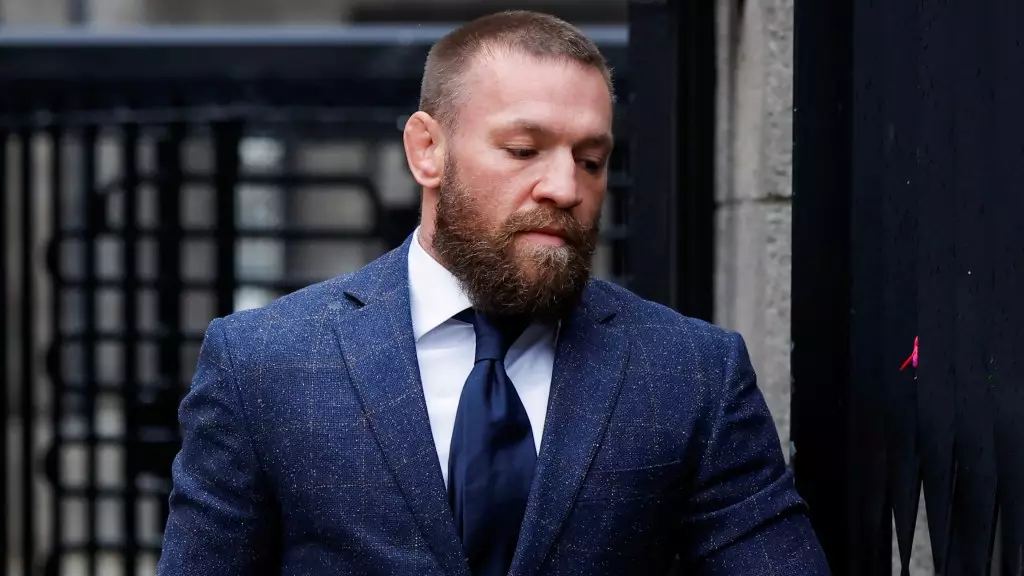The civil lawsuit against UFC superstar Conor McGregor has captured significant media attention as it enters its closing phases in Dublin. The case revolves around serious allegations of sexual assault brought forward by Nikita Hand against McGregor and his co-defendant, James Lawrence. This entire legal saga is indicative of not only individual actions but also the broader societal implications regarding consent, celebrity culture, and the legal system’s handling of sexual assault allegations.
Central to the case are the claims made by Hand, who alleges that she was sexually assaulted by McGregor and Lawrence in a hotel room after a night of heavy drinking in December 2018. According to Hand’s narrative, she was too intoxicated to provide consent, and her experience depicts a grim reality for many women who find themselves in vulnerable situations. Despite the seriousness of her claims, the fact that criminal charges were not fully pursued adds a layer of complexity to the scenario. Hand proceeded with a civil lawsuit in early 2021, which suggests potential inadequacies in the criminal justice response to her case.
The trial has now reached a critical juncture with closing arguments made by both sides, each seeking to persuade a jury of their stance. Hand, portrayed as a victim, claims that her experience was deeply traumatizing and has resulted in significant psychological distress. Her allegations raise essential questions about the thresholds of consent and the responsibility of those in social settings where alcohol is involved.
McGregor has been vocal in denying all allegations against him, describing them as fabrications. During his time on the witness stand, he made impassioned statements to discredit Hand’s account, claiming that he felt “petrified” due to the claims being made against him. Notably, he acknowledged having used cocaine around the time of the alleged incident but insisted that all interactions with Hand were consensual. This admission has sparked debate over whether drug use compromises an individual’s judgment in intimate situations.
Additionally, McGregor’s attorney, Remy Farrell, has focused on undermining Hand’s credibility. Farrell highlighted inconsistencies in her memory of events and drew attention to supporting testimonies that seemed to contradict her claims. Notably, the defense has pointed to surveillance footage appearing to show the individuals in a state of mutual affection, which is pivotal in crafting an alternative narrative.
James Lawrence, the co-defendant, has also provided testimony that attempts to corroborate McGregor’s account. In a striking defense strategy, Lawrence claimed that he had sexual encounters with Hand that were initiated by her. This assertion complicates the narrative put forth by Hand, as her recollection of events differs dramatically. It is crucial to note that the jury must navigate these conflicting accounts carefully to make an informed decision.
In the closing arguments, each attorney was given the opportunity to capture the jury’s attention one last time, framing their cases in a manner designed to resonate on a personal and emotional level. Hand’s attorney painted a picture of a victim deeply scarred by the behavior of two men who he alleges colluded to create a narrative beneficial to them. He invoked testimonies from medical professionals that emphasized Hand’s psychological trauma, arguing that the incident had life-altering repercussions.
In stark contrast, the defense’s case leaned heavily on the idea that sensationalized accusations could not serve as a substitute for concrete evidence. They urged the jury to apply a reasoned approach, focusing on the evidence presented rather than preconceptions about McGregor’s character as a high-profile athlete. Herein lies the tension between public perception and legal judgment, a dynamic often at the center of cases involving prominent figures.
The outcome of McGregor’s civil trial holds implications beyond the courtroom, casting light on societal attitudes toward consent and the responsibilities that come with fame. As discussions around sexual assault evolve, how the jury interprets conflicting accounts could set a precedent for similar cases in the media spotlight. The tension between individual rights, societal sympathy for victims, and the unyielding principles of due process creates a complex framework within which justice operates.
As the trial resumes, the jury will deliberate on evidence, testimonies, and the complexities surrounding the human experience. Whether McGregor will be held liable for the claims made against him remains to be seen, but it is undeniable that this case will continue to stir discussions about consent, celebrity culture, and the legal mechanisms available to victims seeking justice. The challenges faced during the trial highlight an urgent need for improvements in how society engages with allegations of sexual assault, providing better support for victims while ensuring justice remains impartial and fair.

